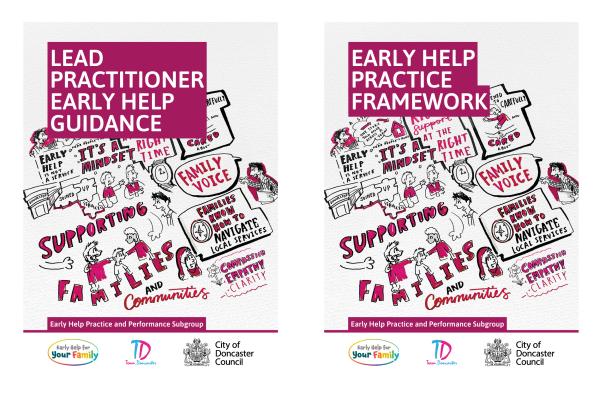
Some practitioners undertake the Lead Practitioner role as a regular part of their day-to-day functions; others practitioners occasionally or rarely do this. The Early Help Coordinator team provide a range of support to develop the skills, knowledge and confidence to be an effective lead practitioner, whatever your role or experience of early help. We also provide information and guidance about Early Help in Doncaster useful for practitioners who are part of Teams Around the Family; or those in contact with children and families.
We have created two easy to use guides to provide information about being a lead practitioner and useful tools and approaches for working with people. Both documents can be accessed on the resources index on the right of this page.
The Early Help Practitioner Guide sets out what a Lead Practitioner does; the Early Help Outcomes we want every child and their family to achieve; the assess, the assess, plan, do, review process; and what needs to happen and when for children and families receiving Early Help.
The Early Practice Framework simply describes the approaches, tools and models used in Doncaster to work well with children and their families and where to find more information or training.

Early Help Coordinators are highly experienced practitioners, their role is to provide support and guidance with any aspect of Early Help. There are two Early Help Coordinators in each of the four locality areas, another within each Your Family Locality Triage; and two within Doncaster Multi-Agency Safeguarding Hub (MASH).
- Case advice
- Thresholds case mapping and step up support
- Case management, case recording and time frames
- Case audits
- Training delivery
- Duty line and email
- Screening within MASH and Your Family Locality Triage
We provide lots of training to help practitioners understand what Early Help is, their roles and responsibilities; how to provide effective Early Help. Training is booked via BuyDoncaster: https://buy.doncaster.gov.uk/Training
- Early Help in Doncaster -an introduction
-
Our two hour foundation course that focuses on what Early Help means and everyone’s roles and responsibilities in identifying when a child and their family would benefit from this. Learners develop skills in talking to families about early help and knowledge about referral pathways. Information about Doncaster Continuum of Need and DSCP Multi Agency Thresholds is also shared. This course is for anyone new to early help Doncaster or working with children and their families.
- Being a Lead Practitioner and Working with Families
-
Our essential full day course for anyone undertaking the Lead Practitioner role in Doncaster. Learners development skills in working with families; how to undertake early help assessments and plans using the Early help Outcomes Framework; explores useful theories, models and approaches; and how to keep good quality records within Mosaic integrated case recording system. The course develops skills, knowledge and confidence to undertake Early help with families and the support available from the Early help Coordinator team.
- Good Quality Assessments
-
This two hour course is suitable for anyone already undertaking the Lead Practitioner role who would benefit from updating their assessment training but don’t need to complete the full day ‘Being a Lead Practitioner and Working with Families’ course. This courses focuses on how to undertake a good quality early Help assessment at levels 2 and 3 of the Continuum of Need and how to record this work within Mosaic, the integrated course file recording system.
- Early Help Outcomes Framework-outcomes we want to achieve
-
Our short course takes about an hour and a half, introducing the Early Help Outcomes Framework to learners who are already undertaking the Lead Practitioner role. The course focused on identifying which outcomes a family already achieved and those they need help to reach; how to record these within the early help assessment ad plan; and how to evidence when outcomes have been reached within Mosaic integrated case recording system.
- Managing Engagement
-
Our managing engagement course lasts under three hours, it develops understanding about the barriers to engaging in help and how to resolve these using my most important tool we have-ourselves. Learners explore conflict and resolve using communication skills; models of reflection and how to apply to develop practice skills and knowledge.
- Early Help and Neglect
-
Our course lasts under three hours focusing on what Neglect looks like within the Early Help threshold; how to discuss this with children and their families address this; and how to work with families to prevent needs escalating. This course is suitable for anyone working with children and their families, it complements the Graded Care Profile 2 course which should also be undertaken.
- Supervision for Early Help
-
Our three hour course is focused at managers and leaders of staff who undertake early help. We explore what supervision is; why it is essential for everyone working with children and their families; and use Morrison’s 4x4x4 model to maximise the impact for all stakeholders. Practical issues such as environment and record keeping are included.
- Reducing Parental Conflict
-
Our full day course explores what Parental Conflict is; the impact on children in the short and longer term; and how to reduce this by improving parent self-awareness and communication skills. All learners receive the Parental Conflict handbook that provides the 6 session framework and activities to use with parents.
- Parenting Cooperatively
-
This full day course focuses on conflict between parents who are no longer or never were in a couple relationship but need to reduce conflict within their co-parent relationship. The course includes grief and loss, co-parenting plans, and wider family and new relationships. All learners receive the Parenting Cooperatively handbook that provides the 6 session framework and activities to use with parents along with the Parent Journal.
- Outcome Star
-
This full day course explore is suitable for everyone working with children and their families to support them make positive change. Licensed trainers deliver the course which includes the Journey of Change, using the star and resources to explore needs and inform planning. Outcome Star is a fantastic tool to use in measuring the impact of work with children and families at the start and end points of practitioner involvement, as well as aiding communication and motivation. All learners will be licensed to use the star and have access to a range of resources.
- Parent Carer Assessments
-
This one hour course explains the reasons for Parent Carer Needs Assessments and equips learners with the skills to complete the assessment and identify next steps to support parent carers. This is a course for Practitioners who support the families of Children, Young People with additional needs.
- Needs Led Neurodevelopmental Pathway
-
This one hour course outlines the new Needs Led Neurodevelopmental Pathway process and is suitable for anyone working with children and their families who need awareness of the process .
We work closely with partners to support delivery of:
- Doncaster Safeguarding Induction
- Graded Care Profile 2 (NSPCC)
- Before General Development Assessment (GDA)
There are useful websites to support families and Lead Practitioners:
Families Information Service provides information, advice and guidance for parents, carers, practitioners, children and young people on a wide range of services and activities/events available in Doncaster and beyond: https://www.doncaster.gov.uk/services/schools/families-information-service-fis
Information and support for adults, young people and children to live happy, healthy lives, and discover what is available in your local communities via the Your Life website: https://www.yourlifedoncaster.co.uk/
Early Help Case Audits
The Early Help Coordinator team undertake case file audits to ensure the Early Help provided to children and their families is safe and effective; and identify the training and support needs of Lead Practitioners, their organisations and the partnership workforce.
Cases are randomly selected for audit each month, the Lead Practitioner and their Manager or Designated Safeguarding Lead are notified the date the audit will be undertaken, usually within the following two to three week. Once the audit has been undertaken the Early Help Pathway Lead undertakes a standardisation process and feedback is provided to the Lead Practitioner and their manager or Designated Safeguarding Lead along with case advice, recording guidance, and recommendations for training and development. Audit outcomes follow OFSTED grading criteria of Outstanding, Good, Requires Improvement and Inadequate.
The Audit explores the child’s Mosaic case file and gains the child and parent or cares voice. The audit form and guidance notes are available within the resources section of this page. Audits focus on:
- Relationships, Direct Work and Communication
- Child Development
- Early Help Assessment
- Intervention and Planning, Decision Making and Problem Solving
- Case Recording
- Impact
Top Tips to demonstrate effective Early Help within the case file are:
- Makes sure the case file is up to date. Early Help Assessments should be completed within 30 working days, Team Around the Family Review meetings held every 6 weeks, and the child seen monthly.
- Use case notes to record case actions such as contact with the family, other professionals, and referrals made.
- Use documents to upload copies or images of direct work such as Outcome Stars or 3 Houses; referrals made; and signed consent forms.
- Identify which Early Help Outcomes the family need help to achieve within the Early Help Assessment, then demonstrate how he family are being supported to reach these within Plan and Team Around the Family Meeting forms.
- The voice of the parent or carer and that of other professionals is important and should be seen in the Early Help Assessment and Team Around the Family Meeting forms.
- The voice of the child is essential; for infants and nonverbal children this could be gained through recording observations of interactions and responses; for older children this should also be through discussion about their needs and wishes, use of tools and activities can be useful in these conversations. Child’s voice should always be relevant to their situation.
Published 4th March 2024
